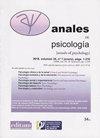Validity of Self-Reports Provided by People With Autism Spectrum Disorder Without Intellectual Disability: A Meta-Analysis
IF 1.3
4区 心理学
Q3 PSYCHOLOGY
引用次数: 0
Abstract
Background: Literature collects that people with Autism Spectrum Disorder without Intellectual Disability (ASD-noID) frequently suffer co-occurring clinical problems that predict poorer adult outcome and reduce quality of life (QoL). Previous studies pose doubts about their capacity to recognize and communicate these problems, but that is an issue that, although relevant, has not yet been systematically revised. Method: A meta-analysis on 32 studies (1422 pairs of participants) was carried out to assess to what extent self-reports provided by people with ASD-noID match those provided by their parents. The articles were categorized according to the domains assessed and method. Results: Significant differences between self- and hetero-reports were found in the domains of Depression, QoL and Social skills (d= 0.406; -0.399 and -0.683, respectively), but not in Anxiety and Social anxiety. The average degree of agreement between both groups of reports was r = .40. Conclusions: Self- and hetero-reports do not provide interchangeable results on the problems of people with ASD-noID. However, a general inability to validate self-reporting cannot be attributed to them. Deeper analysis is necessary to allow to optimize the use of self-reports in this population with both clinical and research purposes. Antecedentes: La literatura recoge que en las personas con Trastorno del Espectro del Autismo sin discapacidad intelectual (TEA-noDI) concurren frecuentemente problemas clínicos que predicen peor ajuste en su vida adulta y reducen su calidad de vida (CdV). Estudios previos plantean dudas sobre la capacidad de estas personas para reconocer y comunicar estos problemas, pero esta cuestión, aunque relevante, no se ha revisado sistemáticamente. Método: Se realizó un meta-análisis sobre 32 estudios (1422 pares de participantes) para evaluar hasta qué punto los autoinformes aportados por personas con TEA-noDI coinciden con los aportados por sus padres. Los artículos se categorizaron en función de los dominios evaluados y el método. Resultados: Se encontraron diferencias significativas entre auto- y hetero-informes en los dominios de Depresión, CdV y Habilidades sociales (d = 0.406; -0.399 y -0.683, respectivamente), pero no en Ansiedad y Ansiedad social. El grado de acuerdo medio entre ambos grupos de evaluaciones fue r = .40. Conclusiones: Los autoinformes y los hetero-informes no proporcionan resultados intercambiables, pero no se puede atribuir a estas personas una incapacidad general para aportar autoinformes válidos. Se necesitan análisis más profundos que permitan optimizar el uso de autoinformes en esta población tanto con fines clínicos como de investigación.无智力障碍的自闭症谱系障碍患者自我报告的有效性:一项荟萃分析
背景:文献收集到,患有自闭症谱系障碍但没有智力障碍(ASD-NOID)的人经常共同出现临床问题,这些问题预测了较差的成人结局并降低了生活质量。以前的研究对他们承认和交流这些问题的能力提出了质疑,但这是一个虽然相关但尚未系统审查的问题。方法:对32项研究(1422对参与者)进行荟萃分析,以评估患有ASD-NOI的人提供的自我报告与父母提供的自我报告的程度。文章根据评估的领域和方法进行了分类。结果:在抑郁、QOL和社会技能领域发现自我报告和异性报告之间存在显著差异(分别为-0.406;-0.399和-0.683),但在焦虑和社会焦虑方面没有发现差异。两组报告之间的平均协议程度为R=.40。结论:自我和异性恋报告并不能就ASD-NOID患者的问题提供可互换的结果。然而,无法将验证自我报告的一般能力归因于他们。需要进行更深入的分析,以优化这一人群在临床和研究方面使用自我报告的情况。背景:文献表明,在患有自闭症谱系障碍但没有智力障碍的人中,经常出现临床问题,这些问题预测他们成年后的适应能力较差,生活质量下降。以前的研究对这些人识别和交流这些问题的能力提出了疑问,但这个问题虽然相关,但尚未得到系统的审查。方法:对32项研究(1422对参与者)进行荟萃分析,以评估TEA-NODI患者提供的自我报告与父母提供的自我报告的一致程度。根据评估的领域和方法对文章进行了分类。结果:自我报告和异性报告在抑郁、CDV和社交技能领域存在显著差异(d=0.406;-0.399和-0.683,分别),但在焦虑和社交焦虑方面没有差异。两组评估之间的平均一致程度为r=.40。结论:自我报告和异质报告不能提供可互换的结果,但不能将这些人普遍无法提供有效的自我报告归咎于他们。需要进行更深入的分析,以优化在这一人群中为临床和研究目的使用自我报告。
本文章由计算机程序翻译,如有差异,请以英文原文为准。
求助全文
约1分钟内获得全文
求助全文
来源期刊

Anales De Psicologia
医学-心理学
CiteScore
3.30
自引率
5.90%
发文量
57
审稿时长
4-8 weeks
期刊介绍:
Anales de Psicologia / Annals of Psychology is a multidisciplinary journal of the various thematic areas of scientific psychology. It publishes original research articles and theoretical review in any of its basic, applied and methodological areas included within psychology.
Publishing, financing, marketing and distribution corresponds Editum: Editions of the University of Murcia (Spain). The organizational guidelines and editorial policies come from the Editorial Team (elected for four years by the Areas and / or Departments of Psychology at the University of Murcia) and the Editorial Board, composed of scholars and experts from different universities and institutions national and international. It is published in print (ISSN: 0212-9728) since 1984 and in Internet publishing (web) (ISSN: 1695-2294) since 2000. Available online full text in pdf from the vol. 1 1984.
Anales de Psicologia / Annals of Psychology maintains a system of exchange with other journals and publications of psychology in the world. Through an free exchange agreement with their respective publishers or entities responsible for editing, these journals and publications are received at the University of Murcia (Biblioteca "Luis Vives", near the Faculty of Psychology) and in return, our journal is sent to libraries and educational and research institutions such centers responsible for editing.
 求助内容:
求助内容: 应助结果提醒方式:
应助结果提醒方式:


